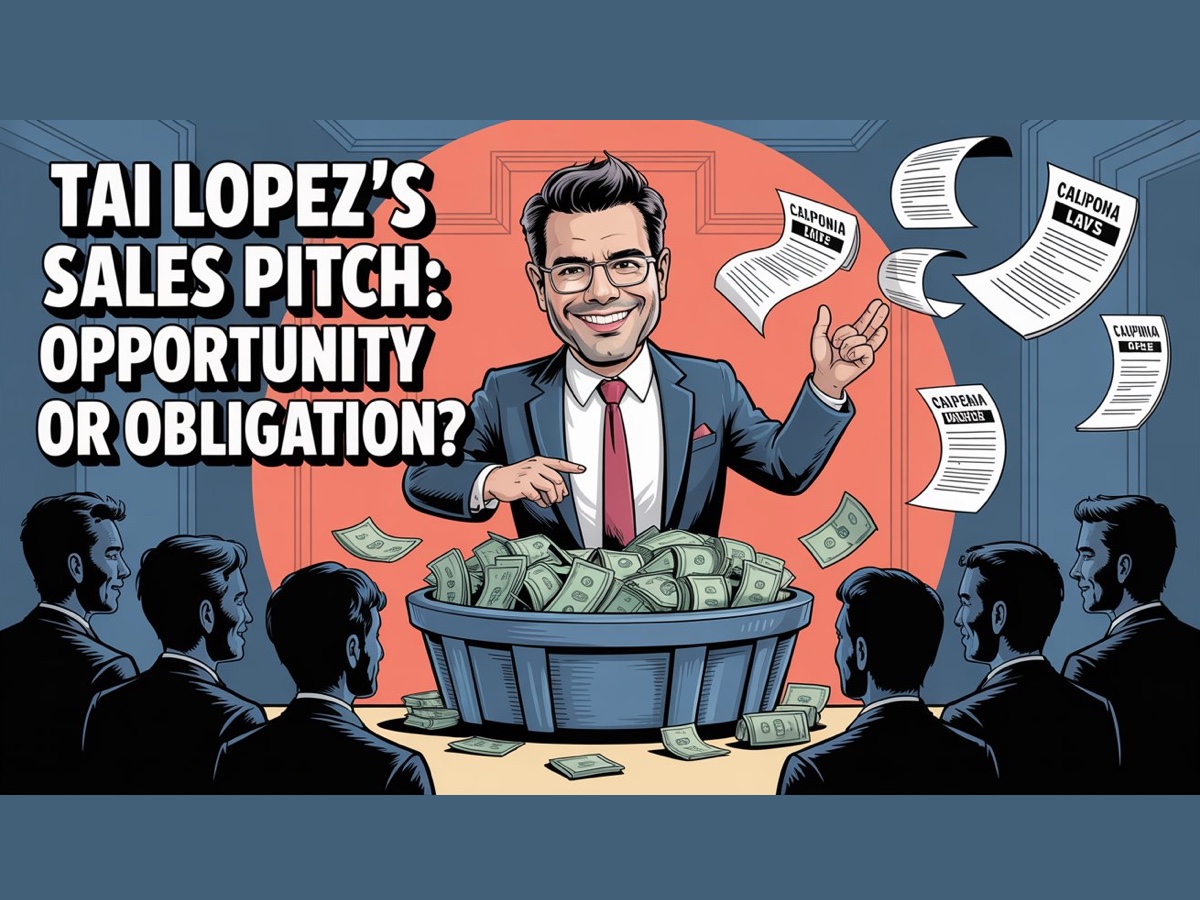By Corey Chambers
HELP WANTED — Tai Lopez, a prominent figure in online entrepreneurship, is under scrutiny for his recent sales recruitment practices. A video circulating online features Lopez seeking skilled high-ticket sales closers, offering flexible work arrangements and emphasizing the abundance of leads. However, concerns have arisen regarding the financial obligations imposed on prospective hires.
The Recruitment Pitch
In the video, Lopez appeals to experienced sales professionals, highlighting the potential for substantial earnings and the flexibility to work remotely or from an office. He underscores the high demand for sales closers, not only for his ventures but also for his business partners.
The Financial Commitment
Reports from individuals who have engaged in the recruitment process indicate that candidates are presented with a requirement to invest $3,000 in sales training, with payment plans available. Additionally, an $8,000 package is offered for those wishing to meet Lopez in person, with monthly payment options.
Legal Implications in California
California labor laws stipulate that employers must compensate employees for mandatory training related to their job duties. Unpaid or employee-funded mandatory training is generally considered illegal in the state. If the training is a prerequisite for employment and directly related to job functions, employers are obligated to bear the associated costs.
Voluntary vs. Mandatory Training
The legality of Lopez’s training program hinges on whether it is truly voluntary or a de facto requirement for employment.If candidates are led to believe that purchasing the training is essential to secure a position, this could constitute a violation of labor laws.
Ask an attorney
While offering training programs can be a legitimate business practice, it’s imperative that such offerings are transparent and comply with labor regulations. Prospective employees should be fully informed about the nature of any training, its costs, and whether it’s a condition of employment. Employers must ensure that their recruitment and training practices adhere to legal standards to avoid potential violations.
YouTube does not officially allow bait-and-switch advertising. This kind of practice violates both YouTube’s ad policies and Google Ads’ misrepresentation policy. Here’s a breakdown of what that means:
🚫 What Is Bait and Switch?
Bait and switch refers to:
- Advertising a product, service, or offer that is misleading or not actually available.
- Then switching the offer to something less desirable, more expensive, or unrelated once the user engages.
📜 YouTube / Google’s Policy on Misleading Ads
YouTube ads are governed by Google Ads policies, which explicitly prohibit:
- Misleading content: Ads must not misrepresent information or trick users into interacting.
- Unavailable offers: Ads can’t promote products/services that aren’t available or don’t function as advertised.
- Misleading calls to action: You can’t imply a false sense of urgency or mislead with your CTA.
If a video ad says, “Get this free iPhone now,” but clicking leads to something entirely unrelated or behind a paywall, that’s bait-and-switch and violates the policy.
⚠️ Enforcement: Does YouTube Actually Enforce This?
Yes, but enforcement can be inconsistent due to:
- Automated systems that can’t catch all misleading tactics.
- Massive ad volume, allowing some bad actors to slip through.
- Some ads running for short durations before they are flagged or taken down.
YouTube does remove such ads once they’re reported or flagged, but they often get seen first, especially on channels with large viewership or during trending topics.
✅ What You Can Do
- Report the ad: Click the ⓘ icon or the three-dot menu on the ad and choose “Report ad.”
- Select “Misleading or scam” or similar reason.
For individuals considering such opportunities, it’s advisable to consult with legal professionals or labor authorities to understand their rights and the legality of the employer’s practices.

Copyright © This free information provided courtesy Entar.com with information provided by Corey Chambers, Broker DRE 01889449. We are not associated with the seller, homeowner’s association or developer. For more information, contact 888-240-2500 or visit WeSellCal.com Licensed in California. All information provided is deemed reliable but is not guaranteed and should be independently verified. Text and photos created or modified by artificial intelligence. Properties subject to prior sale or rental. This is not a solicitation if buyer or seller is already under contract with another broker.











